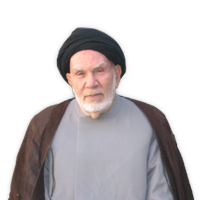Research on the Scientific Path of Democritus
In the Name of God
Research on the Scientific Path of DemocritusDerived from Series of Teachings and Speeches of Esteemed Philosopher, Ostad Mousavi
Democritus lived around the year 435 BC. Many say Plato based many of his views on those of Democritus.
Democritus’s father was a very wealthy man. Some say he inherited over a million of today’s dollars from his father, which was a big sum of money for that time.
Initially, he was an animal caretaker. He then turned to plants and came to know God and found the truth through plants. After stating that plants and trees move, he was pronounced insane. Hippocrates was appointed to treat him. He advised Democritus to drink milk. A bowl of milk was brought. Democritus had a look at the milk and said, “This belongs to a black and young cow.” In other words, he saw the reality behind the particles of the milk and understood where they originated from. They investigated and found what he had said was right. Hippocrates bowed in front of him and said he had to make use of the knowledge Democritus had. He also said, “Those who consider you insane, are themselves insane.”
He traveled to Egypt and few other African countries, also to Babylon, Iran, and India. He used his wealth to seek wise scientists and eventually found a scientist in Thebes. He stayed in Thebes for some time. Upon finding a master, he gave all his money to the people. He said he wanted to be free of monetary belongings so that he would become ready from within. He was criticized for donating his wealth.
He replied, “I prefer discovering a posteriori or priori reasoning in philosophy or geometry to being given a throne.”
This is why Democritus became the person he did. We are now talking about him after about 25 centuries. He did not attain this status easily. Millions of wealthy people have died leaving nothing after them; even if they have left something, it was nothing but problematic.
He was extremely humble and avoided scientific disputes. He said, “In science, there should be reasoning and understanding and not disputes.” If a person wants to achieve a true goal in life, he/she should do so by scientific reasoning. He would distance himself from those who would explain scientific issues through conflicts. (This is absolutely right as disputes dim realities. Disputes are like dust which cover shiny glasses and stain them.) He said, “I have a brightness which will be stained with dispute.” This was why he avoided disputes.
He said, “Wise is he who trains himself and is free of superstitions.” He believed a wise person would not accumulate money or title for himself and that these were only the cause of restriction and destruction. He, who is willing to give his life for the smallest of material things, will obviously die if those things are taken from him.
He said, “The greatest cause of man’s prosperity is his power of thinking.”
He found that the center of philosophy was Athens in Greece and travelled there without revealing his identity. Only a few recognized him who asked why he had not revealed who he was. He replied, “If people recognize me, my knowledge will lose its protection. I prefer this anonymity.” (Philosophy is such that if one is well-known, there may be the possibility of his/her becoming proud.)
He would sometimes interpret philosophy through the senses. He said, “The most significant thing for man in the world is his ear and his eye.”
He believed the world was a world of contracts and stipulations. For example, he believed something termed ‘bitter’ was not in reality bitter and was only termed so. These were merely agreements among the members of societies. He believed maybe something sweet was agreed to be called bitter and something palatable to us was termed sweet. He said this was not right and was only because of agreements and contracts.
He believed the lives of men and women were contractual, so also their jobs and occupations. He said realities are hidden deep behind these. In other words, realities were buried under contracts. All are not able to find what reality is.
He said, “Man should seek the source of joy within himself, not from others.” (i.e. one should be so strong from within that he finds joy from inside and not expect others to make him happy.)
He said, “Particles have a tendency to move downwards and there is uproar within these particles and this uproar manifests the invocation ‘God’.” Although he lived before Islam, his views conform to those of the Holy Quran: “Whatsoever is in the skies and whatsoever is on the earth glorifies Allah.” (Surah Jumu’ah, Ayah 1).
He said, “No power in the world is as strong as man’s mystic and gnostic power.”
He also said, “I searched a lot and found that no material can be divided infinitely, as all are connected by affection.”
He was pronounced insane but said, “I laugh at the insanity of man.”
His philosophy was and still is of great significance. His writings in philosophy were first translated into Syriac, then to Hebrew and finally into Arabic.




Comments
0